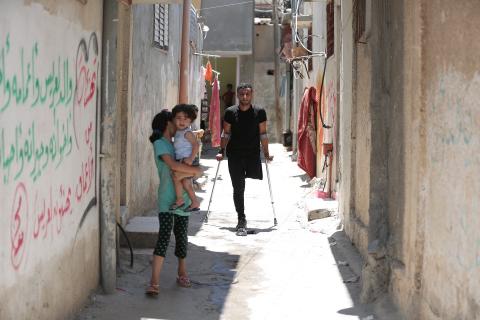
The Maryknoll Office for Global Concerns joined over 70 organizations in urging the U.S. Senate to support Sen. Bernie Sanders’ (VT) amendment to the FY2022 National Defense Authorization Act (NDAA) to require a report on the humanitarian impact of severe restrictions on movement, access, and goods in and out of Gaza and potential solutions to the crisis.
Download the PDF of the letter
November 15, 2021
We, the undersigned organizations, urge that [U.S. Senators] support Sen. Sanders’ amendment to the FY2022 National Defense Authorization Act (NDAA) to require a report on the humanitarian impact of severe restrictions on movement, access, and goods in and out of Gaza. Should it be adopted, we hope you will work to preserve it through conference negotiations.
This important provision would require the Comptroller General of the United States, in consultation with the President, the Secretary of State, the United Nations, and other key stakeholders, to submit a report to Congress assessing the restrictions on Gaza, including:
- The economic, humanitarian, political, and psychological impact that severe restrictions on movement and access has on Palestinians in Gaza;
- The economic and material impact of restrictions on movement and access on recovery and reconstruction efforts following the Israeli airstrikes in May 2021;
- Whether the implementation of the Gaza Reconstruction Mechanism is adhering to international dual-use standards;
- Possible solutions to address the humanitarian and political crisis in Gaza, including the lifting of Israel’s sweeping restrictions on the movement of people and goods;
- The feasibility of replacing the current inspection mechanism at Israel’s crossings into Gaza with an international inspection mechanism for commercial and humanitarian goods entering and exiting Gaza, to be supervised by the United Nations and modeled after the United Nations Verification and Inspection Mechanism for Yemen;
- The feasibility of implementing a new international agreement, facilitated by the United Nations in consultation with all key stakeholders, on movement and access for Gaza, in a transparent and accountable way that addresses humanitarian, economic, and legitimate security concerns.
After roughly 14 years, the severe restrictions on Gaza have left nearly 2 million people with severely limited access to clean water, electricity, and food; prevents critical supplies from reaching Gaza which is necessary for maintaining and rebuilding water treatment and sanitation infrastructure; roughly 97 percent of Gaza’s tap water is contaminated, depriving civilians of regular access to drinkable water. The restrictions have also left Gaza’s electrical grid in ruins, forcing many Palestinians to live without electricity for nearly half the day. More than 80 percent of Gaza’s population relies on humanitarian aid.
We, the undersigned organizations, urge you to support Senator Sanders’ amendment to the FY2022 NDAA, to create more transparency and accountability regarding the humanitarian impact of the restrictions on Gaza and to advance solutions to address the crisis, which will advance human security and safety for Israelis and Palestinians alike.
Thank you for your consideration of this important matter. New solutions are needed to end Gaza’s humanitarian crisis, decrease tensions and help end the endless cycles of violence that have endangered the lives of Israeli and Palestinian civilians caught in the crossfire. The Gaza Reconstruction Mechanism, according to the UN and humanitarian aid groups working to deliver aid in Gaza, has not been able to overcome the restrictions and ensure civilian wellbeing and humanitarian access. This report is a critical step for Congress and the American people to understand the full impact that current restrictions on movement and access have on Palestinians in Gaza and will facilitate the identification of structural reforms to address the crisis. This reporting requirement includes feasibility studies on new internationally-supervised inspection measures, assesses if the current Gaza Reconstruction Mechanism adheres to internationally-recognized standards for dealing with the issue of “dual-use” goods, and studies the efficacy of establishing specific benchmarks for the volume and timeframe of imports.
